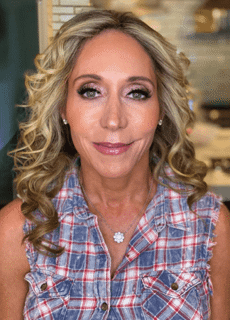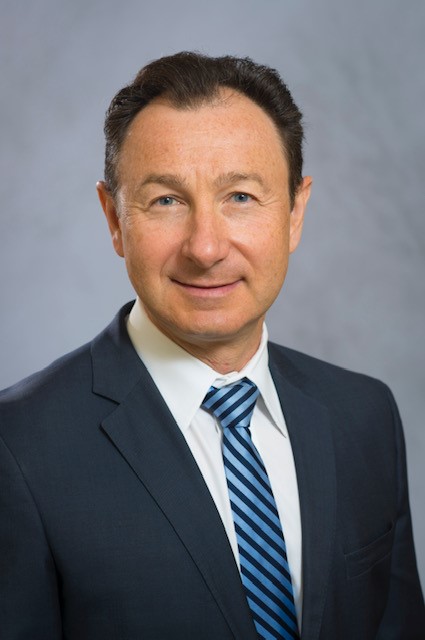“A week after surgery at MMC, I had a birthday party to go to-and, to my surprise, I was up for it.”

It felt like déjà vu for Katherine Weiss, 52, of Colts Neck. Last winter, the mother of three teenage boys started feeling familiar symptoms of hiatal hernia—difficulty swallowing, heartburn and regurgitation. “When I ate, acid would come up, making it hard to swallow,” Katherine says. “It felt like someone had poured acid down the back of my throat.”
The symptoms had previously plagued Katherine for almost a year, forcing her to take strong acid-blocking medications and eventually undergo surgery. This time, however, her condition was compounded by a scary, new symptom— choking on food that was stuck in her throat.
Fortunately, Katherine turned out to be an ideal candidate for a new technology called the EndoFLIP Impedance Planimetry System, which has resolved her problem, possibly for good.
Fighting the Fire
Katherine’s ordeal began two years ago, when she experienced the first symptoms of hiatal hernia. The condition happens when part of the stomach pushes into the chest through an opening where the esophagus and stomach meet.
To avoid aggravating her acid reflux, Katherine eliminated spicy foods and coffee, and even stopped eating out. “It changed my feelings about going out or enjoying a meal,” she says. “It got to the point that everything around food made me miserable.”
Katherine’s doctor put her on a proton pump inhibitor (PPI), a medication that reduced the stomach’s acid production and relieved her discomfort. “But it’s not good to stay on those for a long time,” Katherine says. Research links PPIs to problems such as kidney disease, cardiovascular problems and vitamin deficiencies, so they are recommended only for short-term use.
In September 2020, Katherine had surgery to move the herniated stomach back into place and tighten the opening at the bottom of her esophagus. Her recovery was challenging due to surgical complications. “I’ve had numerous other surgeries,” she says, “but this was by far the hardest recovery.”
Just a few months later, Katherine’s symptoms seemed to be back, and she returned to her doctor for tests. The verdict: “Either the surgery failed or the hernia hadn’t been repaired correctly,” she says.

Katherine’s doctor then referred her to board-certified minimally invasive general and robotic surgeon Dmitry Oleynikov, MD, who joined Monmouth Medical Center (MMC) in 2020 as Chair of the Department of Surgery. A nationally recognized expert in gastrointestinal surgery, including complex abdominal wall hernia and revisional bariatric surgery, Dr. Oleynikov offers patients access to the most advanced treatment options including the latest robotic surgical techniques.
“Her esophagus was just not working properly,” Dr. Oleynikov says. “To figure out how well the esophagus works, you need to be able to tell whether it’s squeezing food into the stomach properly. The valve at the bottom of the esophagus that connects it to the stomach has to open to let food in and then close so food doesn’t come back up. If those functions aren’t working, people have a lot of discomfort.”
Precise Solution
Dr. Oleynikov proposed using the EndoFLIP system to diagnose Katherine’s digestive problems and guide a repair. “This technology allows us to tell what’s going on with the esophagus moment to moment,” he says. “So if someone is having issues, you’re able to really pinpoint where the problem is and fix it.”
Using the system, the surgeon guides a balloon mounted on a thin catheter down the throat to the esophagus. Sensors on the balloon measure the organ’s pressure and size, helping physicians better diagnose and treat esophageal disorders.
“It gives us information that we just couldn’t get our hands on before, and helps us be much more precise with the work that we’re doing,” Dr. Oleynikov says. Doctors can then use a surgical robot or a conventional laparoscopic procedure to perform needed repairs.
MMC was among the first two hospitals in New Jersey to introduce EndoFLIP technology, and the Digestive Health Center is one of a handful of centers in the region with experts trained to use it. The center has performed almost 100 procedures using EndoFLIP since the hospital acquired the device. So far, “the outcomes have been uniformly excellent,” Dr. Oleynikov says.
Katherine had to think hard before agreeing to another surgery. But Dr. Oleynikov reassured her that the system allowed him to adjust the esophagus-to-stomach opening to just the right tightness so she wouldn’t choke on food or experience reflux. He also said that because her robotic repair would require fewer and smaller incisions, recovery would be easier.
“And honestly, it really was!” says Katherine, who had her procedure in May 2021. “My recovery from the two surgeries was like night and day. A week after surgery at MMC, I had a birthday party to go to—and, to my surprise, I was up for it.”
Free of her digestive symptoms, Katherine returned to the gym in the second post-op week, and says she feels like a new woman. “I’m so glad I trusted Dr. Oleynikov,” she says.
To learn more about digestive surgery at Monmouth Medical Center, call 732-923-6070.